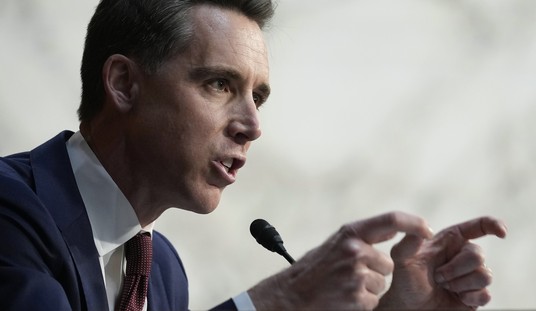Last week, President Obama formally submitted his plan to Congress for closing down detention/interrogation operations at Guantanamo Bay. It’s a plan that, if implemented today, would be a violation of federal law – but don’t assume that’s the end of the story for this president as he sprints, during his final year in office, to fulfill an ill-conceived campaign pledge to close Gitmo.
The plan lays out Obama’s three “lines of effort” the administration is pursuing: 1) Continuing to attempt to transfer to foreign countries 35 detainees previously deemed eligible for transfer out of the 91 total remaining detainees; 2) Continuing to determine whether other detainees beyond those 35 might also be eligible for such transfers abroad; and 3) hold the rest under the laws of war while they’re considered for either transfer to the United States for prosecution in Article III criminal court or military commission, transfer to a foreign country, or continued law-of-war detention inside the United States.
Unsurprisingly, the plan has not been well-received by many on Capitol Hill. Aside from the fact that the national security risks associated with shutting down detention operations there remain as serious as ever, the part of Obama’s proposal that entails bringing detainees onto U.S. soil for prosecution or law-of-war detention is, well, illegal. Congress has spoken on this several times over the past several years, repeatedly passing legislation through the National Defense Authorization Act (NDAA) and related appropriations bills – in a bipartisan fashion – barring the use of federal funds for the transfer of Gitmo detainees to the U.S., and for the construction of a new facility or modification of an existing one for that purpose. Each time, the President has signed these restrictions into law, his objections to them notwithstanding.
Recommended
And it’s not just Obama’s critics who are pointing out that, according to the law, he can’t legally bring detainees to American soil. Attorney General Loretta Lynch has now said twice, including just after the plan was submitted, that the law precludes any U.S. transfers, and Secretary of Defense Ashton Carter has said the same thing.
Perhaps most significantly, the leaders of the United States military have dealt a major blow to Obama’s plans in this regard. Several months ago, Rep. Mike Pompeo and fifteen other Members of Congress who also served previously in the military, sent a letter to the Joint Chiefs of Staff urging them to seek legal counsel before implementing any order by President Obama to transfer Gitmo detainees to the United States, in light of the legal prohibition on such a move. In a short but highly consequential response to the letter from Congress, the Joint Staff recently indicated: “Current law prohibits the use of funds to ‘transfer, release, or assist in the transfer or release’ of detainees from Guantanamo Bay to or within the United States and prohibits the construction, modification, or acquisition of any facility in the United States to house any Guantanamo detainee. The Joint Staff will not take any action contrary to those restrictions.”
That statement has major ramifications. Since Guantanamo is a military base, the uniformed military would by definition have to “transfer, release, or assist in the transfer or release” of detainees to the United States, even if Obama tried to get around this prohibition by involving domestic law enforcement in the transfer process in some way.
So in light of what the law, the Attorney General, and the Secretary of Defense, have to say about this key component of Obama’s plan – and the United States military’s statement that it will not be helping to carry it out absent a change in the law – is the president done trying to close Gitmo?
Not necessarily.
The law does not prevent the president from transferring Guantanamo detainees to most foreign countries, although it does put in place certain requirements that have to be met in the course of initiating such transfers (including a thirty day notice-to-Congress requirement that Obama previously ignored when he transferred five top Taliban leaders, then-imprisoned at Gitmo, to Qatar, in exchange for the Taliban’s release of Army Sgt. Bowe Bergdahl). It would not be surprising to see Obama try to accelerate the foreign transfer process in order to whittle down the detainee population dramatically.
For that matter, since he’s not barred from doing this, why hasn’t it already happened? Why aren’t those countries who so roundly condemn Gitmo, and so celebrated the end of the Bush presidency and the arrival of the Obama era, lining up to help him get rid of Gitmo once and for all, especially now with time running out for this president?
Foreign transfers continue to be a tough sell, both here and abroad, with good reason – it turns out these guys are dangerous. Obama’s own Office of the Director of National Intelligence estimates that the recidivism rate for former Gitmo detainees returning to or suspected of returning to the battlefield is around 30%, accounting for detainees transferred under both the Obama and Bush administrations – recently, we learned that former Osama bin Laden aide Ibrahim al-Qosi, who Obama released in 2012, is now a major figure in the leadership of Al Qaeda in the Arabian Peninsula (AQAP), and that a former Gitmo detainee released by Bush in 2004 was among those recently arrested in Spain for ties to ISIS. If these are the kinds of detainees that were previously deemed eligible for transfer, that should tell us a lot about who’s left.
If an acceleration-of-foreign-transfers approach proves too difficult, the president may yet decide to test his theory that the domestic transfer prohibitions in the NDAA are an unconstitutional infringement on his prerogatives as Commander-in-Chief, and attempt to proceed via executive order. While it would certainly appear that the Joint Chiefs’ response to the Pompeo letter has made that task considerably harder, a belt-and-suspenders effort from Congress is advisable, particularly since the President (as of this writing) still has yet to explicitly rule out circumventing Congress to bring detainees here. To that end, Rep. Jeff Duncan has introduced a resolution authorizing a House lawsuit in the event that the President decides to try that – the question in the coming months will be whether the need for such a lawsuit arises.
Important milestones have been achieved in preventing Obama from closing Gitmo, but with many months left before January 2017, victory laps would be ill-advised.

























Join the conversation as a VIP Member